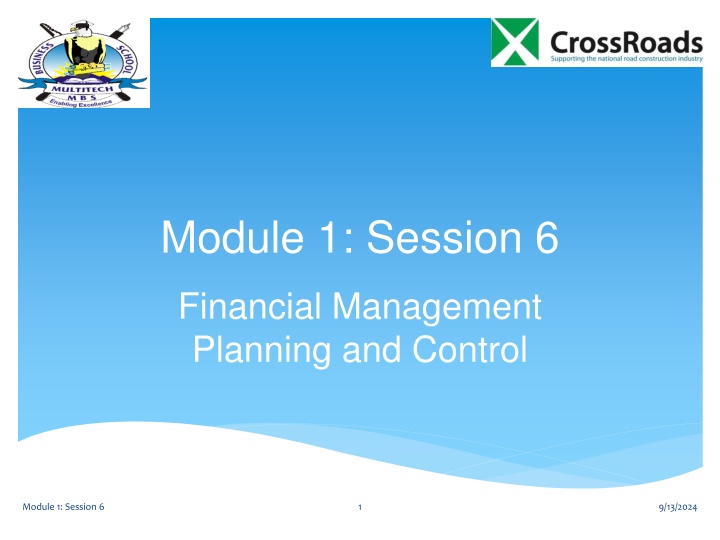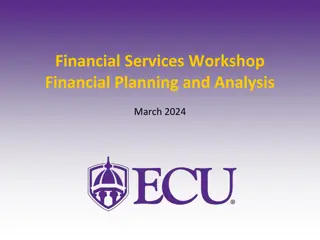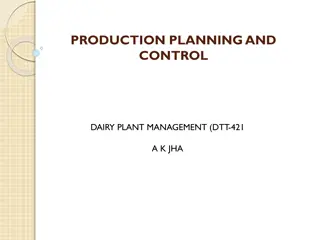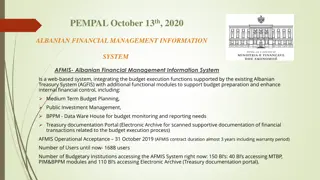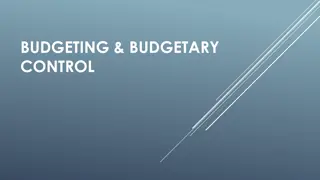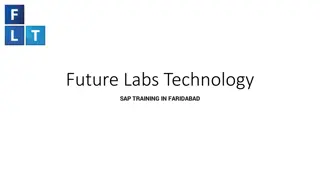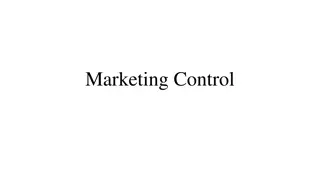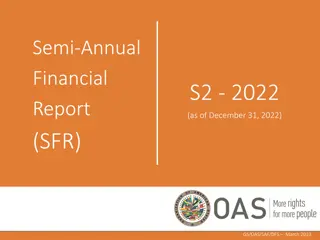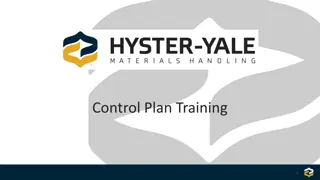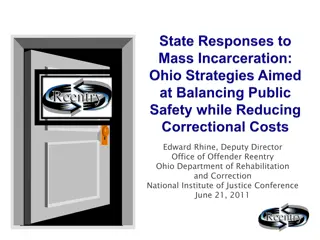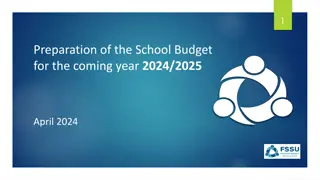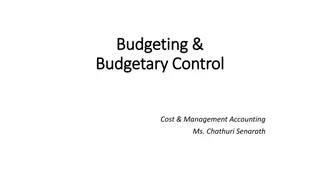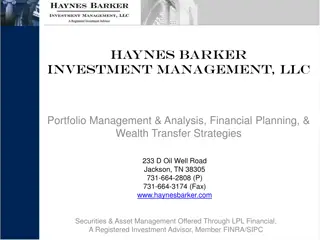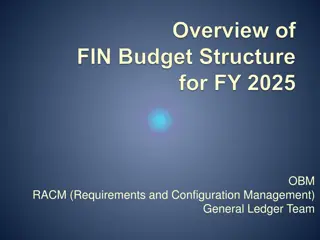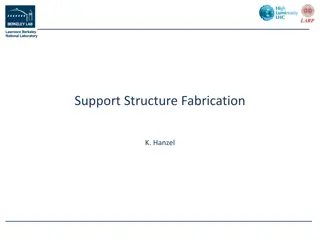Budgetary Planning and Control in Financial Management
Exploring the concept of budgetary planning and control, this module covers different budgeting approaches such as Incremental Budgeting, Zero-Based Budgeting, and Activity-Based Budgeting. It discusses the purpose of budgets, budgetary control processes, typical variances in road construction, and the value for money concept. The session also touches upon taxes affecting financial planning for contractors and the application of variances and variance analysis in budget management.
Download Presentation

Please find below an Image/Link to download the presentation.
The content on the website is provided AS IS for your information and personal use only. It may not be sold, licensed, or shared on other websites without obtaining consent from the author.If you encounter any issues during the download, it is possible that the publisher has removed the file from their server.
You are allowed to download the files provided on this website for personal or commercial use, subject to the condition that they are used lawfully. All files are the property of their respective owners.
The content on the website is provided AS IS for your information and personal use only. It may not be sold, licensed, or shared on other websites without obtaining consent from the author.
E N D
Presentation Transcript
Module 1: Session 6 Financial Management Planning and Control Module 1: Session 6 1 9/13/2024
Purpose of the Session Introduce the concept of budgetary planning and control Influence attitudes from incremental to zero or activity based budgeting. Demonstrate the basic application of variances and variance analysis e.g. Total, usage, efficiency and price variances. Introduce the value for money concept Indicate the common taxes that affect financial planning of contractors. Module 1: Session 6 2 9/13/2024
What is a budget A budget is a management tool to guide and control performance. All activities of the business should be budgeted for and monitored. During tendering the cost budget is a useful tool to guide tender bidding prices. A budget, once approved, serves as a yardstick against which performance may be measured. Module 1: Session 6 3 9/13/2024
Budgetary Control The budgetary control process operates by comparing actual to planned performance and Determining the variances and their effect on results Interpreting the cause, Identifying responsibility for them. Variance analysis helps to inform future actions and decisions e.g. future bids, remedial action, investigation etc. Module 1: Session 6 4 9/13/2024
Approach to budgeting Incremental Budgeting (IB) uses historical figures and apply a margin for volume and inflationary adjustments. Zero Based Budgeting (ZBB) builds up the cost from the basic elements that make up the task. The cost budget should best be built up from the quantity surveyors estimates. Activity Based Budgeting (ABB) builds up the budget based on activities that are to be performed and for each task identify the input, output, cost and outcome. Module 1: Session 6 5 9/13/2024
Typical variances in Road Construction Total variance is the difference between budgeted and actual expenditure (Budgeted cost less actual cost) Material usage variance is the difference in the quantity of materials used at the budgeted price =(budgeted quantity less actual quantity )x the budgeted price. Module 1: Session 6 6 9/13/2024
Typical variances in road construction Material price variance is the difference in price of the actual quantity used =(budgeted price less actual price) X the actual quantity. Labour or machine efficiency variance is the difference in labour or machine time at the budgeted rate =( budgeted time less actual time) X budgeted rate/price Labour or machine rate variance =(the budgeted rate or price less the actual rate) X the actual hours taken. Module 1: Session 6 7 9/13/2024
Responsibility for variances It is important to investigate causes and persons responsible for variances. Purchasers are usually responsible for price related variances and at times usage if the materials are not of the expected quality Supervisors are usually responsible for usage and efficiency variances Module 1: Session 6 8 9/13/2024
Responsibility for variances Machine operators could be responsible for machine efficiency variances. However those responsible to hire or to train machine operators or to train staff could also be responsible for efficiency rates. Persons responsible for maintenance of equipment could cause machine efficiency variances. Module 1: Session 6 9 9/13/2024
Value for Money Concept (VfM) 1) Is utilising resources most effectively and efficiently in order to get desired results of quality, cheapest and quickest. 2) It involves maximizing quality obtained but minimizing input resources including time. 3) Calls for stretching resources to the maximum. 4) Requires focusing not only at output but also the outcome compared to the resources we expend. In road construction vfm means having integrity, being frugal, having speed and delivering durability. Module 1: Session 6 10 9/13/2024
Value for money consciousness Works should be conceived, planned, executed and evaluated for VFM, including quality and time. Assess the output, the outcome and the resources to be consumed for VFM. Ensure the desired output occur. Ensure the expected outcome is realized. Ensure the processes are cost effective. Keep asking what could be done better if any. Ask what else can now be done to ensure/improve the outcome. Module 1: Session 6 11 9/13/2024
Common taxes and statutory obligations that affect costs Trade license Value Added Tax Income/corporation tax Rates Withholding tax PAYE NSSF (employer contribution) District income levy Local services tax Module 1: Session 6 12 9/13/2024
Group assignment 1. With ref. to case study data, suggest a simple budget for Munaku to rehabilitate 2km with 2nd grade gravel. 2. Outline the weakness of the pricing method of Munaku and analyse why Munaku did not realize his anticipated profit. 3. Using the availed budget work out the usage, price and efficiency variances and explain possible causes. 4. Explain what you understand by value for money and why a road contractor should aspire to deliver value worthy. 5. Identify possible taxes levied on a tax contractor and show how they relate to contract costing. All agree on actionable points. Module 1: Session 6 13 9/13/2024
END Q&A Module 1: Session 6 14 9/13/2024
2kms incremental budget Munaku's Incremental bid Historical cost 210,000,000 Economic mark up 30% 63,000,000 Expected cost 273,000,000 Margin 30% 81,900,000 Price 354,900,000 Rounded up 355,000,000 Module 1: Session 6 15 9/13/2024
2kms Zero Based Budget Ideal Zero Based Budget bid Item cost per unit Quantity Cost Materials: Gravel in tonnes 5,000 20,000 100,000,000 Machine hire in hours 400 200,000 80,000,000 Fuel for machines in lts 40,000 3,000 120,000,000 Direct labour (man days) 900 10,000 9,000,000 Supervision (man months) 4 500,000 2,000,000 Total cost 311,000,000 Margin 30% 93,300,000 Bid price 404,300,000 Costs underestimated by 14% and bid price understated by 12% Module 1: Session 6 16 9/13/2024
Variances and persons responsible Usage Price Efficiency Total Gravel Machine Fuel Labour Total cost variance (100,000,000) 20,000,000 (80,000,000) 16,000,000 300,000 (13,500,000) (77,200,000) - 16,000,000 24,000,000 (6,000,000) 10,000,000 (18,000,000) (5,700,000) (7,500,000) 6,800,000 (118,000,000) Budgeted profit Actual profit 93,300,000 16,100,000 Responsibility for variance Variance due to machine operator Variancence due to Purchaser 40,000,000 6,800,000 Variance due to supervisors Total profit variance (124,000,000) (77,200,000) Module 1: Session 6 17 9/13/2024
